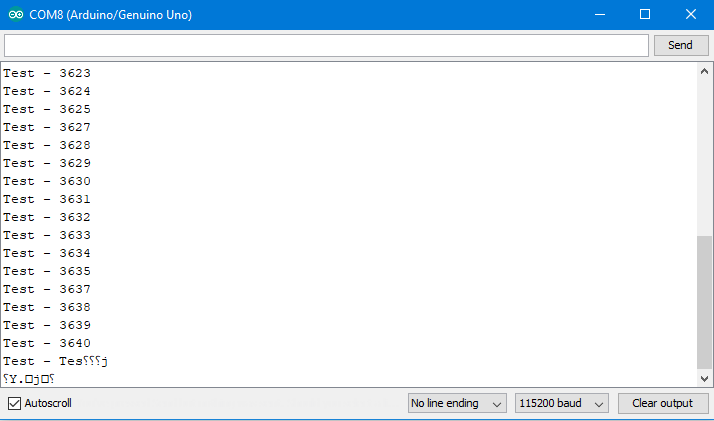I am working on a proof-of-concept ADC to "explode" what's inside of an ADC chip for teaching purposes.
Currently, I have a sketch that uses a push-button to act as a clock-pulse that counts up (1, 2, 3, 4, ...) for every positive edge using the attachInterrupt() function.
The sketch works great to view the data in the serial monitor.
I am pairing the Arduino (Teensy 3.2) with a Raspberry Pi configured to read data off the Serial line to a text box.
After a good bit of troubleshooting it appears that the attachInterrupt() function corrupts the Serial buffer with garbage for every interrupt. For instance, if I use
Serial1.flush();
Serial1.begin(115200);
immediately after the interrupt and then send out my data using Serial.println() I get my expected decimal value at my output. However, without these lines I just get unicode garbage at my Serial output. See full "fixed" sketch code below:
My question is: why is this happening? I should not need to restart Serial every iteration of the clock.
#define HWSERIAL Serial1
const int numBits = 12; //Number of bits in ADC (resolution)
const int comparatorPin = 14; //Pin number of comparator out
const int clockPin = 15; //Pin number of external clock (square wave) input; expecting clock with 50% duty-cycle
volatile int comparatorState = 0; //Is comparator high or low?
volatile bool clockState = 0; //Is clock high or low?
volatile int masterCount = 0; //Our master count
volatile bool isSameVal = false; //Is the value of the master count the same value as last cycle?
int outVal = 0;
int masterBinCount[12]; //Array to store binary value of the master count
byte outputPins[12]; //Array to store the numbers associated with the output pin numbers
int maxValue = 0; //Initialize max counter value to zero
void setup() {
Serial.begin(115200); //Begin Serial transmission
HWSERIAL.begin(115200, SERIAL_8N1);
HWSERIAL.flush();
delay(2000);
defineOutPins(outputPins); //Assign pin numbers for output pins
pinMode(14, INPUT); //Comparator Pin
pinMode(15, INPUT); //Clock-in pin
maxValue = pow(2, numBits); //Set max counter value to max bit resolution. Ex. for 12 bits --> 4096
}
void loop() {
attachInterrupt(clockPin, doOnClock, RISING); //When clock is on a positive-edge execute doOnClock function
HWSERIAL.flush();
HWSERIAL.begin(115200);
if(isSameVal == false) { //If the master count is NOT the same as the last cycle
convertDecToBin(); //Convert the master count (dec) to binary
binaryToPins(); //Send the binary value (via digitalWrite) to output pins
}
else {
//Do nothing
}
delay(1000);
}
void defineOutPins(byte pinNos[]) { //Assign pin numbers to parallel binary out: Teensy 3.2 pin #0 --> #11
for(byte i = 0; i < numBits; i++) {
pinNos[i] = {i}; //Assign current pin this value
pinMode(i, OUTPUT); //Define pins as outputs
}
}
void doOnClock() {
comparatorState = digitalRead(comparatorPin); //Check comparator state
if(comparatorState >= 0.5) { //Check if positive clock pulse
if(masterCount == (maxValue - 1)) { //Check if current count value is at "ceiling"
//Do nothing
}
else { //Else increment count up
masterCount++;
}
}
else if(comparatorState < 0.5) { //Check if negative clock pulse
if(masterCount == 0) { //Check if current count value is at "floor"
//Do nothing
}
else {
masterCount--; //Else decrment count down
}
}
isSameVal = false; //Set "finished" counting for this clock-pulse
}
void convertDecToBin() {
for(int j = 0; j < numBits; j++) {
int tempCnt = bitRead(masterCount, j);
masterBinCount[numBits - (j+1)] = tempCnt; //Populate the master binary count array in "reverse" order starting with the LSB at the highest array index
}
}
void binaryToPins() {
for(int e = 0; e < numBits; e++) {
//digitalWrite(outputPins[e], masterBinCount[e]); //Write our master binary value to output pins
//Serial.print(masterBinCount[e]); //THIS LINE IS FOR TROUBLESHOOTING!!
}
isSameVal = true; //Tell program we wrote the master count to the pins for this clock cycle
outVal = masterCount;
Serial.println(outVal);
HWSERIAL.println(outVal);
//Serial.print(" decimal: "); //THIS LINE IS FOR TROUBLESHOOTING!!
//Serial.print(masterCount); //THIS LINE IS FOR TROUBLESHOOTING!!
//Serial.println(""); //THIS LINE IS FOR TROUBLESHOOTING!!
}


attachInterrupt()should be in setup()